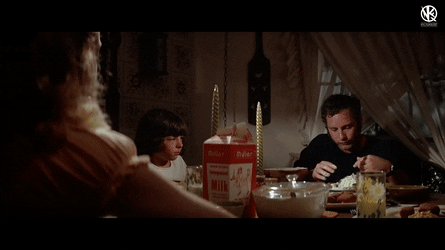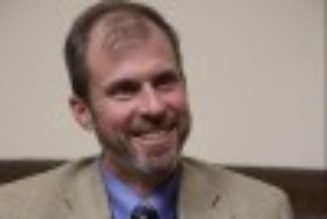Happy Friday friends,
And a very happy Easter Friday to you all. If last week was Good Friday, and we were all fasting and abstaining, this week is the opposite.
I love the liturgical wisdom and the implied metaphysics of the Easter Octave. The feast of the victory of Christ over death is so comprehensive, it so radically shatters the order of time and space, that a single day cannot contain it.
There’s a temptation by this point to get a little bored with the psalms and antiphons in the Liturgy of the Hours, which don’t vary even a little, for the whole week — at least for me there is. But I try to remind myself that the repetition is intended, it is instructive, I need it.
This isn’t the “Friday after Easter.” It is still Easter, today. Every day is Easter, for eight days. I love it.
And an important part of living this time of Easter is, of course, feasting. This is most definitely a “meat Friday” and, while it isn’t exactly a sin to eat fish or salad today, I suggest you might want to examine your conscience if you do.
Feasting is, to my mind, at least as important a spiritual discipline as fasting, though it tends to be one to which we pay a lot less attention.
Everyone talks about Lent, what they are giving up (or trying to), and how much spiritual progress they are making with it. But how many of us talk about what we are doing to properly feast the whole season of Easter, which lasts a whole 50 days?
The temptation for me is to bang out a decent lamb roast on Sunday and get back to the office Monday morning like nothing happened. And it’s a temptation I have been trying hard to resist this year.
That’s the reason we made a real effort here at The Pillar to take some time off this week.
For me, this meant a Monday barbeque with friends, at which many and several kinds of animals were consumed as a burnt offering to the Lord, and taking my daughter to her first baseball game — a home opener, no less.
I do not, just to be clear, take all this to mean license for overdoing things. Just as Lenten fasting isn’t a time for Pelagian self-improvement, so Easter feasting isn’t a pass for sinful self-indulgence.
And, as it happens, I’ve had something this week to keep me focused on the absolute core of the Easter feast, which I’ll get to in a moment.
But, in the meantime, we didn’t stop work completely here at The Pillar this week. So let’s look at what’s been going on.
The News
Catholics affiliated with Opus Dei gathered in Rome April 12 for what is likely to prove a significant event in the group’s history.
Pope Francis explained at the time that he wanted to “reaffirm the charism of Opus Dei,” while also “specifying,” not to say “changing,” the organization of Opus Dei, “in keeping with the witness of the Founder, St. Josemaría Escrivá, and with the teachings of conciliar ecclesiology on personal prelatures.”
The group’s prelate, Msgr. Fernando Ocáriz, has said that the Dicatery for Clergy has told Opus to propose some “possible adjustments to [their] statutes that seem appropriate in light of the motu proprio” and told them “to spend as much time as necessary without any hurry.”
Deciding what changes are needed and how to bring them in is what they are talking about in Rome this week.
—
After a bid to open the country’s first religious charter school was knocked back in Oklahoma this week, the state’s Catholic conference has said they are pressing on with the project.
But Brett Farley, executive director of the Oklahoma Catholic Conference, told us that the board’s decision is not a final rejection, but a common procedural step in order to request more information.
“This is actually the more normal course for applications to the board. In fact, I think the majority of those that they ultimately approve are initially denied pending revisions. So ours is following the same course,” he told The Pillar.
The plan for an online Catholic charter school is aimed at Catholics living in rural areas of the state, where there are no brick-and-mortar Catholic schools nearby. If it gets the eventual greenlight, it will be something of a landmark: it would be the first explicitly religious charter school in the country — charter schools are taxpayer funded, but they are run independently and are not tied to a specific neighborhood.
—
Ask anyone and they will tell you that the Church in Europe is in decline. Mass attendance is down. Baptisms are down. Catholic weddings are down.
And none of this seems to have been helped by the bishops who, in some places, are proposing radical changes to Church teaching to get hip to der zeitgeist.
Well, Edgar spoke to four young converts to Catholicism — all received recently into the Church — to find out how they became interested in Catholicism, and how they decided to convert.
This is a fascinating report. And it’s also just full of Easter encouragement.
—
Fr. Stephen Wang is an interesting man. The rector of the Venerable English College, a 400 year old seminary in Rome, his story of faith begins with his grandparents, Chinese Christians who lived in Guangdong until emigrating to the UK in the 1930s.
Today, in addition to running an ancient seminary, Fr. Wang is also the coordinator of the Sycamore program, an informal course he helped create as a university chaplain to help people discover more about the Christian faith.
The Institute of Catholic Culture is now enrolling new students in our upcoming free, online course: Sacred Liturgy: History & Principles of Christian Worship. Join us for a deep dive into the rich symbolism and meaning of the Mass, the Sacraments, sacrifice and worship, the liturgical calendar, and more!
Inevitable incoherence
Some of you may remember that last week, we reported on some changes Pope Francis made to the penal law section of the Code of Canons for the Eastern Churches — the parallel to the Latin Code of Canon Law.
When we first reported on the changes, it looked like there was not much to report: the pope had pretty much moved to bring in changes to the Eastern code which he’d already made to the Latin code in 2021. But then we looked closer.
As I wrote in an analysis this week, this latest change follows years of legal reforms in which we have seen different papal laws define totally different standards for who is considered a “vulnerable adult.”
Meanwhile the pope’s own experts on abuse reform have disagreed publicly not just on the definition of a vulnerable adult, but even if such a category should exist separately to people who can be treated as minors — or now infants, apparently.
Given the time and tears put into creating a credible mechanism for handling cases of abuse of adults in the wake of events like the McCarrick scandal, this is all immensely frustrating.
Basic definitions of law for distinct categories, like those equivalent to a minor and specially vulnerable adults, would, you would hope, be the bedrock of coherent legislation across special papal motu proprios, codes of canon law, and other Vatican policy documents.
Instead we have virtually no two legal sources using the same language, and hardly ever can you find two experts arguing for the same understanding or application of the law.
Waking Fr. Bob
As a little peek behind the curtain for you all, I am editing this week’s newsletter from my car, in a church parking lot. It’s Friday morning, a little before 2 a.m., so please pardon any special lapses in grammar and spelling this week.
The reason I am here is I have been sitting with a friend. And I am planning on going back to sit with him some more in a moment. His name is Robert. Fr. Bob, to me and everyone else who knew him. He died earlier this week, on Easter Sunday no less, and some of us who loved him are taking turns sitting vigil with his body tonight until his funeral tomorrow morning.
Fr. Bob had been struggling with cancer for I am not sure how long. He really wasn’t sure either, but he got the diagnosis over Christmas. Confined to bed for much of the last month and longer, he was told he was in his final days just as Holy Week began.
Last week, some of us came to see Fr. Bob for what we understood would likely be our last visit. He was never a physically imposing man, even less so in recent years. But even so, he was smaller and slighter still as he lay in bed last week.
About twelve of us stood around him, prayed the rosary, said Vespers, and solemnly sang the Apostles Creed for and with our friend as he prepared to depart. His eyes were closed, but his mouth twitched along with the responses. As we finished up, the priest among us imparted the Apostolic pardon, and said in a loud voice “Bob, now you bless us!”
His eyes opened, he straightened in bed, his hand shot out from the covers and he replied “May Almighty God bless you, in the name of the Father, and of the Son, and of the Holy Spirit.”
I don’t know how conscious he had been as we prayed with him, if this was some heroic marshaling of strength on his part, or if it was the near-automatic response of a lifetime of training body, mind, and soul for the service of ministry. I’m not sure which would make it more beautiful. But it doesn’t really matter.
They were not the last words Fr. Bob ever spoke, and I don’t know if it was the last blessing he ever gave. But it was the last thing I heard him say, and I am grateful to have received it.
There’s a lot I will remember about Fr. Bob.
I first met him more than a decade ago, when I had come to DC as a grad student to study canon law. Getting to know him, he told me he had spent some time in care as a child and he had discovered his vocation thanks to the religious sisters and priests who had shown him such kindness there.
His priesthood, he told me, was conceived in gratitude to the Church that had helped to raise him for a time, and to God. And, he said, he was constantly grateful to be a priest. He told me once that he was not academically gifted and had struggled terribly with Latin and Greek as a seminary student only to find, as he expected to fail, that his was the one ordination class excused from the exam as everyone was still working to figure out how Vatican Council II was going to shake out.
Fr. Bob didn’t think he’d been given a miracle like St. Joseph Cupertino, but he was deeply grateful for what he saw as Providence getting him to ordination.
He was big on gratitude, and humility.
Going to confession with Fr. Bob was never a long event, but it was always disconcerting. He would hear you out, and then fix you with his eye and ask “but are you sorry for your sins?” with an emphasis both insistent and genuinely questioning without being skeptical. “You have to be humble to be sorry,” Fr. Bob would tell me.
Fr. Bob was humility personified, at least in my eyes. I served him at Mass I don’t know how many times over the years and he took the mantra of “say the black, do the red” very literally. It never occurred to him that he was worthy to move so much as a comma, or insert his own personality into the liturgy by so much as an inflection of his voice.
A few years ago, a major stroke reduced him to shuffling, more than walking, and his voice (always a nasal rasp) became more of a syrupy growl. He also lost the ability to follow well the words on the page as he said Mass. He needed help, and I would dutifully follow his place across the text, pointing to each word as he went, to help him keep his place.
But though his ability to read and speak had diminished, he compensated with a visible fire of determination in his eyes as he celebrated the Mass. His hands and voice would shake with the effort as he elevated the chalice and paten, but I think the force of what he knew he was effecting by this gesture weighed more on him than the physical demands on his body.
Once, when he’d stumbled badly over the words he’d been saying his whole adult life, he looked over at me holding the missal. “Am I doing it alright?” he asked me with total sincerity and without a trace of embarrassment. It was the most humble thing I have ever seen in my life.
In all the years of his infirmity and failing health, with all the petty humiliations and indignities they brought, I never heard Fr. Bob complain once, but I heard him express his gratitude for something nearly every time I saw him.
I’m headed back into the church now, to pray for Fr. Bob. I pray that the Lord will welcome his grateful servant into heaven, and I’d ask that you do too, if you have a moment.
This morning, as a joy of the octave, I get to celebrate his life and ministry, and enjoy that this endlessly humble priest died on Easter, is being waked on Easter, and will be buried on Easter. I have every confidence he will be raised by his Father on Easter, too.
See you next week, and happy Easter, Christ is risen.
Ed. Condon
Editor
The Pillar
The Institute of Catholic Culture is now enrolling new students in our upcoming free, online course: Sacred Liturgy: History & Principles of Christian Worship. Join us for a deep dive into the rich symbolism and meaning of the Mass, the Sacraments, sacrifice and worship, the liturgical calendar, and more!
Comments 14
Services Marketplace – Listings, Bookings & Reviews















